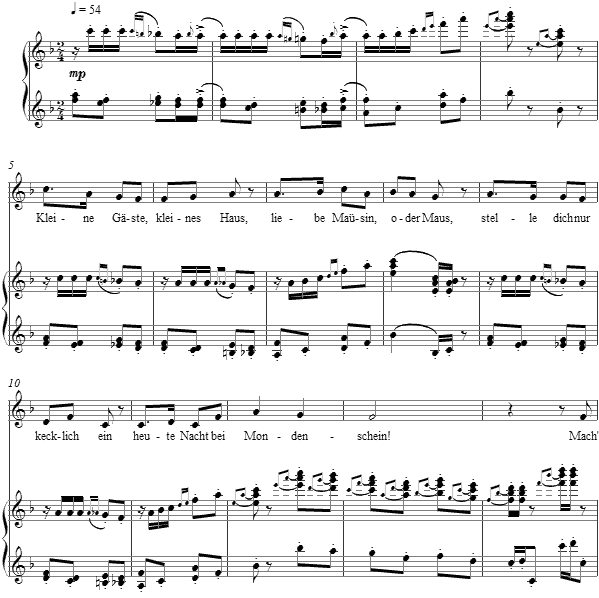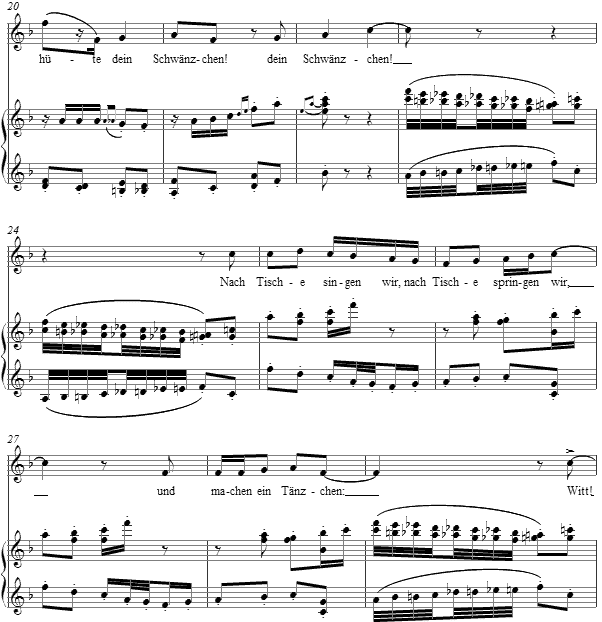Music and Texts of GARY BACHLUND
Vocal Music | Piano | Organ | Chamber Music | Orchestral | Articles and Commentary | Poems and Stories | Miscellany | FAQs
Mausfallen-Sprüchlein - (2009)
Eduard Möricke
for medium or high voice and piano
Kleine Gäste, kleines Haus.
Liebe Mäusin, oder Maus,
Stell dich nur kecklich ein
Heut nacht bei Mondenschein!
Mach aber die Tür fein hinter dir zu,
Hörst du?
Dabei hüte dein Schwänzchen!
Nach Tische singen wir
Nach Tische springen wir
Und machen ein Tänzchen:
Witt witt!
Meine alte Katze tanzt wahrscheinlich mit.[ 3 pages, circa 2' 00" ]
Eduard Möricke
Little guests in your mouse-hole house.
Lovely Miss or Mister Mouse,
Prepare yourself, bold and bright,
This evening in the pale moonlight!
Be very sure to lock your door!
Got that? And then, do wait for more!
You'll preserve your tail, for sure!
After dining, raucous singing starts --
Oh, after dinner we'll take our parts
And have some lively dancing:
Sniff! Smell!
My old cats might dance too near to where you dwell!
Rhymed paraphrase by the composer
Among the treasures of my reading is an English translation by Louise McClellland, of Hugo Wolf's Breife an Melanie Köchert, the translation titled, Hugo Wolf; letter to Melanie Köchert, ed. McClelland, with an introduction by Martin Katz, New York, Schirmer Books, 1990. Wolf set many of Möricke's texts, and this one in particular was published in a set for woman's voice; the text itself comes from Möricke's Gedichte (1867).
Wolf's letters themselves span some years' time, and give a fine insight into the composer's daily life, the hours which he was able to devote to composition, and the schedule to which he held himself. After choosing this text to set therefore, I turned some of Wolf's gestures a bit upside down to use as material for this setting in part for my admiration of his work and the lessons they have offered me over the years.
Wolf was a cat lover, of sorts. On August 2nd of 1895, he wrote to Köchert, "I've been interrupted by my two kittens, who have started up a dreadful yowling on the second floor. Both animals, especially the one, are already tyrannizing me. When they're not around me, they wail continuously. I feel completely enslaved by the two beasts." [p. 171, McClelland's translation.] From such a perspective, one wonders at the sympathetic sense he had for the mice of Möricke's poem.
The opening gesture falls in opposite motion to Wolf's opening gesture for the same text setting. This perky theme, as well as that which accompanies the dance later on, are referential transformations of Wolf's work. The evening prior to composing this, I attended an onstage rehearsal for a production of Die Zauberflöte at the Staatsoper, wherein late in the evening perhaps as many as twenty small children rush onstage, among them the daughter of a tenor in the house. That enthusiasm and energy informed my musical imagery for this setting, as well as Wolf's work did. For this the vocal line is much like a child's song.
The relatively few musical gestures in this setting includes the opposite motion by half steps as shown below, which I imagined as the mice quickly moving their tails out of harm's way -- whether it be from the threat of cats or the thumping tread of dancing feet. Safely out of the way thereby, the dance may commence.
The score is available as a free PDF download, though any major commercial performance or recording of the work is prohibited without prior arrangement with the composer. Click on the graphic below for this piano-vocal score.


